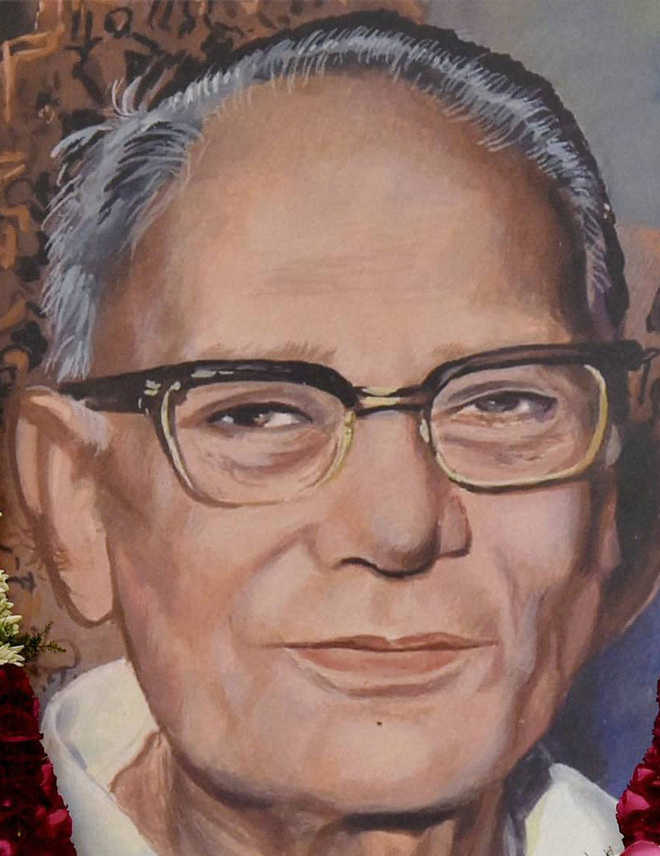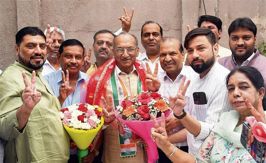
Jaiprakash Narayan
Sandeep Sinha
Sometimes, you can stumble upon history in your backyard, especially when you are watching the state election results herald a change in public mood and also reading a book on the Emergency to complete the circle. It was a revelation for an ignoramus like me to learn that Loknayak Jaiprakash Narayan had been housed at the Post-Graduate Institute of Medical Research and Education (PGIMER) for four months during that period in 1975. Now, my hometown in Jharkhand has the distinction of a young JP making good his escape from the Central Jail there during the Quit India movement in 1942. The British had failed to break his revolutionary spirit even after making him lie on ice slabs in Lahore Fort, so it was interesting to read about his stay at the PGI in custody and its impact on his indefatigable spirit.
The book by Gyan Prakash describes how JP was brought to Chandigarh on July 1, 1975. He was 73 then. The District Magistrate of Chandigarh, MG Devasahayam, was under instructions from Haryana Chief Minister Bansi Lal, “Usko wahin pade rehne do. Kisi se milne ya telephone mat karne dena. Apna aap ko hero samajhta hai.” Devasahayam’s account offers an account of JP’s despondency, “I wonder what use my life is going to be in captivity. Everything seems to be finished.” The fiery revolutionary was going through a low, having lost his wife Prabhawati some time before.
JP’s health deteriorated during his four months of captivity in Chandigarh. Devasahayam found him in low spirits. Doctors found nothing wrong and put his symptoms down to depression. Later, at Jaslok Hospital in Bombay, he was found to be suffering from kidney ailments. The District Magistrate was sympathetic to JP and was of the view that medical neglect, if not downright conspiracy, was to blame for his poor health. The book by Gyan Prakash says that the conduct of the doctors at PGI, led by the redoubtable Dr PN Chuttani, did not breed confidence, in view of Bansi Lal’s attitude. MG Devasahayam, now living in Nagercoil, near Kanyakumari down South, speaking over the phone, stood by it, saying he found the doctors’ attitude “grey”.
His stay at the PGI also saw JP justify his decision to include the Jan Sangh in the united political party. He told Devasahayam that Jan Sangh cadres provided the organisation to support the movement and unburdened himself by saying that the RSS was not formally a part of the alliance. But the incarceration deepened his resolve towards his ideal of Total Revolution (Sampurna Kranti). Leaving for Delhi on November 16, he told Devasahayam, “I came as your prisoner and you treated me as a human being. I will never forget this.” He then also pledged, “I will defeat this woman.” So, it was in the precincts of the Mecca of Medicine that a frail revolutionary made the fire blaze in him again, to defeat a regime that was turning on its own people.
At the recent Military Literature Festival, there was a session on Vir Rasa in Hindi poetry presided over by veteran journalist Mrinal Pande. Ironically, it was a Vir Rasa poet, Ramdhari Singh Dinkar, whose lines were used by JP to rouse the crowd against the Emergency excesses, “Do rah samay ke rath ka ghar-ghar naad suno; sinhasana khali karo ki janata aati hai.” (Hear the rumbling of time, vacate the throne for the people are coming.) It was a poem comparable to “Hum Dekhenge” by Faiz Ahmed Faiz, sung admirably by Iqbal Bano, when Zia-ul-Haq ruled over Pakistan. In the recording, the rousing applause by the crowd in the background, yearning for democracy to return, is a thrilling reminder that revolution is the stuff of streets. It is what the Chilean poet Pablo Neruda wrote about, “And one morning all that was burning, one morning the bonfires, leapt out of the earth, devouring human beings… come and see the blood in the streets…come and see, the blood in the streets, come and see the blood, in the streets.”
Poetry and political activity indeed go together!



























